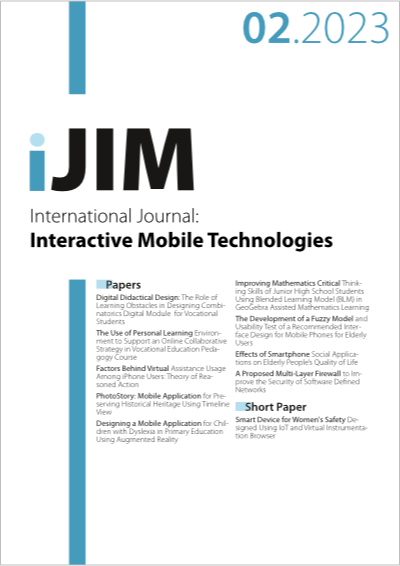Factors Behind Virtual Assistance Usage Among iPhone Users: Theory of Reasoned Action
DOI:
https://doi.org/10.3991/ijim.v17i02.36021Keywords:
Artificial Intelligence; Mobile-computing; iPhone; Siri; Voice Assistance; United Arab EmiratesAbstract
Smartphone usage is increasing due to several features and opportunities offered by manufacturers and service providers. Existing literature attributes this increased usage to the availability of virtual assistants, mainly voice assistants, that ensure users' facility and maximum benefit. This research also focused on the factors behind voice assistant usage, particularly in iPhones among users in the United Arab Emirates. Notably, the conceptual framework in this research is supported by the Theory of Reasoned Action. The researchers adopted a cross-sectional design and gathered data from n= 251 respondents. Data analysis through Structural Equation Modelling revealed that, Perceived Ease of Use, Subjective Norms, and Perceived Behavioral Control work as significant factors contributing to iPhone-based voice assistant usage. On the other hand, Expectation Confirmation also works as a significant factor in Siri usage. On the other hand, Satisfaction significantly mediated (p> .022) the users’ Expectation Confirmation leading to Siri usage among the respondents. Further, the Artificial Neural Network Analysis (ANN) revealed an overall accuracy regarding Training at 14.8% and 30.8% concerning Testing. Thus, it is concluded that the devices accompanied by ease of use are preferred due to their distinguished services. In this regard, highlighting voice assistants' help also reflects the importance of technology in our daily lives. Especially mobile computing is playing a significant role in improving our everyday technology experiences.
Downloads
Published
How to Cite
Issue
Section
License
Copyright (c) 2022 Faycal FARHI, RIADH JELJELI; Ala'aldin Zahra, Salami Saidani; Leila Feguiri

This work is licensed under a Creative Commons Attribution 4.0 International License.



